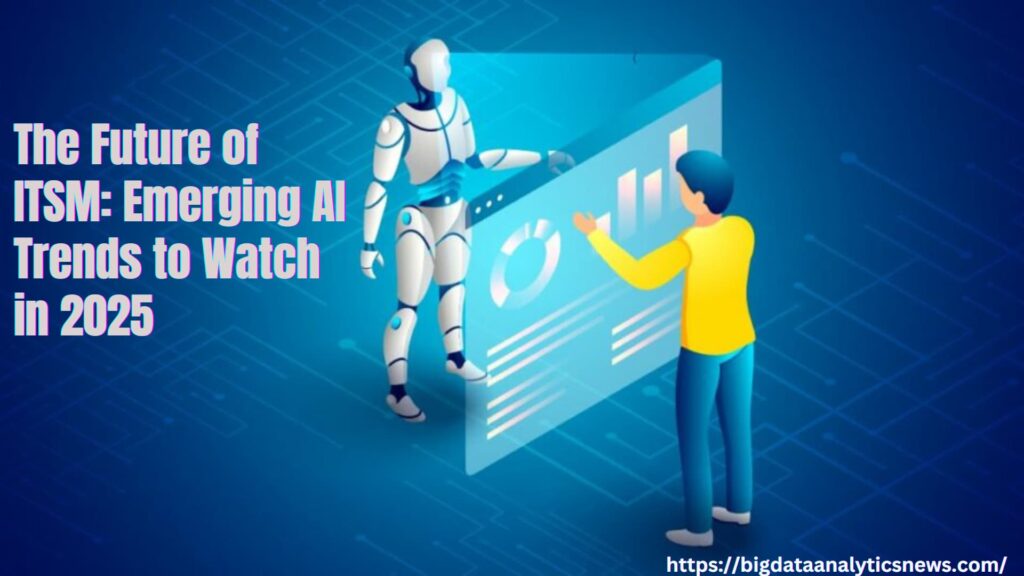

Organizations rely on technology for everything from communication to customer service. However, many businesses deal with underperforming IT departments hampered by high operational costs, inefficiency, restricted scalability, delayed response times, and poor problem resolution. Traditional IT Service Management (ITSM) solutions usually fail to address these issues because of rigid procedures and a lack of flexible practice framework to meet contemporary business requirements.
As we approach 2025, it’s evident traditional methods cannot keep up with the tech-driven environment. From cloud transformation to AI-powered enterprise service management, the transition to more flexible, adaptive service management systems is essential. AI can potentially disrupt ITSM in ways transforming how businesses manage IT services by increasing efficiency and providing exceptional user experiences. Let’s see early examples of this:
AI trends shaping IT service management
AI is an emerging trend transforming the service management system in IT service management (ITSM), revolutionizing how services are delivered. Some of the ways AI is applied in ITSM are:
Automation of routine tasks
Modern IT service management is capable of effectively executing routine tasks. AI automates ITSM operations, increasing operational efficiency and speed. It includes enhanced Level 0 support capabilities with AI-driven chatbots and virtual assistants capable of handling basic inquiries and support requests. From automating routine operations to identifying and preventing problems, AI enables your IT team to focus on major initiatives while providing excellent user experiences.
Predictive analytics for proactive management
AI-driven predictive analytics can detect IT infrastructure issues before they impact your end users. By evaluating patterns and trends, AI alerts your IT team to potential interruptions, allowing for proactive solutions.
- For customers, the reliability of AI-powered IT systems results in smoother user experiences, which increases customer satisfaction as services are continuously accessible without unexpected downtime.
- For employees, AI-enabled proactive management provides your IT team more power, allowing them to prioritize innovation over firefighting, and promoting a culture of efficiency and constant development.
Intelligent decision-making support
AI improves ITSM decision-making by offering actionable insights based on data analysis. Machine learning algorithms review previous incidents and recommend effective remedies, resulting in faster resolution times and higher service quality. Additionally, AI forecasts future demand for IT resources and allocates them appropriately, driving intelligent operations streamlining resource management. Predictive analytics gives insights for better decision-making, resource allocation, and budget planning. Anticipating future demands improves both your operational efficiency and organizational agility.
Machine learning and natural language processing (NLP)
Machine learning and natural language processing (NLP) are revolutionizing ITSM by enhancing the efficiency and effectiveness of service delivery. Machine learning algorithms analyze vast amounts of data to identify patterns and trends, enabling proactive management of your IT services. NLP, on the other hand, interprets and understands text-based data, such as incident reports and service requests. By leveraging these technologies, you can automate numerous ITSM processes, including incident classification and routing, thereby improving response times and service quality. Automation not only streamlines service delivery, but also allows your IT team to focus on more strategic initiatives.
Enterprise Service Management (ESM)
Enterprise Service Management (ESM) extends the principles and practices of ITSM beyond your IT department to other areas of your organization, such as HR, finance, and facilities management. By applying ITSM methodologies across various business functions, ESM enhances the efficiency and effectiveness of service delivery throughout your enterprise. This holistic approach to managing services ensures all departments operate in harmony, providing a seamless experience for both customers and employees. ESM fosters a culture of continuous improvement and innovation, driving business value and supporting organizational change management.
Incident management
Traditional ITSM frequently uses manual incident management techniques, impeding real-time insight into issues and their effects on your business operations. AI is critical to transforming this landscape by discovering the root causes of IT issues. AI discovers hidden patterns and connections in incident data using advanced analytics. Furthermore, machine learning algorithms enable businesses to anticipate incidents before they worsen, decreasing disruptions and improving IT performance.
Service configuration management
AI improves IT asset management by automating the discovery of assets and configurations, keeping the Configuration Management Database (CMDB) up to date. By constantly monitoring configurations, AI can identify anomalies indicating security threats or operational inefficiencies. The CMDB is a critical repository for extensive information on IT assets, configurations, and relationships between them. Using AI to maintain a reliable CMDB ensures data is available for impact analysis and effectively managing changes within your IT environment.
While AI provides breakthroughs in ITSM, transitioning to these AI-enhanced processes is not without hurdles. Critical challenges have to be overcome to ensure AI integrates seamlessly into ITSM processes.
Potential challenges in transitioning to AI-enhanced ITSM processes
When transitioning to AI-based IT service management procedures, your enterprise may confront obstacles in achieving successful integration. Some possible roadblocks include data security and privacy issues, workforce opposition to AI implementation, the need to train your IT team to work with AI technology, and ensuring the ethical use of AI in decision-making processes.
Respond to such challenges by instituting strong data protection measures, developing thorough training programs for employees to become familiar with AI technology, fostering an open-collaborative culture to help bolster AI acceptance, and building clear guidelines for the ethical use of AI tools. Overall, if you can proactively address these challenges, then migrating to AI-enhanced ITSM can be achieved efficiently with the maximum performance and benefit realized by AI investment.
Conclusion
The impact of AI on ITSM is nothing short of revolutionary. From automating routine operations to identifying and preventing issues, AI technologies are transforming the service value chain in IT service management. As you embrace AI-powered solutions, you position yourself to deliver more efficient, proactive, and user-centric IT services, eventually driving business success in an increasingly digital environment. The journey continues, and the full potential of AI in ITSM has yet to be fully realized, making this an exciting moment for IT professionals and the businesses they serve.

